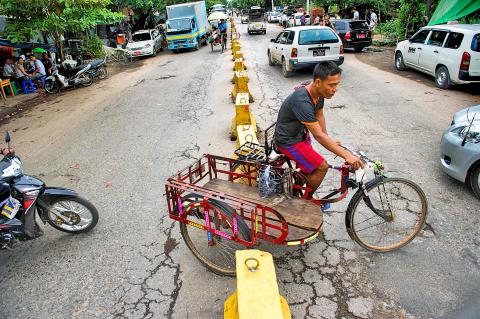Surrounded by a trove of tools and spare parts, trishaw maker Aye Zaw works on his latest model of the pedal-powered three-wheeler, readying it for the clogged roads of Myanmar’s biggest city.
Undeterred by the rapid transformation of Yangon’s streets from sedate thoroughfares to car-choked arteries in just a few years, the 46-year-old revels in defying the changing times with his traditional form of transport.
“I love the work very much,” the craftsman said from a workshop bursting with wheel rims, springs, piping and tools. “I am always finding ways to make trishaws better and better.”

Photo: AFP
He joined the family business at 16, learning the trade from his father, and now works with his younger brother, Htay Zaw, to make about seven trishaws every month.
The cheapest model costs 430,000 kyat (US$318), but customers who pay a little more can opt for one with steel trimmings.
The brothers’ reputation has even spread outside of Myanmar, with one creation snapped up by a US tourist and another by an Israeli embassy official leaving the country.
However, Yangon’s streets are unrecognizable from a few years ago.
Myanmar has seen an explosion in vehicle numbers since a military-backed government in 2011 launched reforms that opened the nation to the outside world after decades of isolation.
Car import rules were relaxed and traffic now moves infuriatingly slowly.
Myanmar has tried to improve the congestion by overhauling the bus system, building flyovers, upgrading a circular railway line and introducing water taxis, but the streets remain jammed.
Sixty-year-old Aung Ba is one of the city’s 25,000 licensed trishaw drivers and has been pedaling Yangon’s streets for 30 years, earning about 10,000 kyat each day.
The busier roads are more dangerous, but Aung Ba said there is still a place for the three-wheelers.
“It wouldn’t be good to drive a car, but riding a trishaw, I can find my way through as I want,” he said.
Aye Zaw is also confident the iconic vehicle will not disappear from Yangon’s streets just yet and would be happy for his son to take over the business.
“I don’t want to force my son into making or not making trishaws, but if he loves the trade then of course he should do it,” he said.

Kehinde Sanni spends his days smoothing out dents and repainting scratched bumpers in a modest autobody shop in Lagos. He has never left Nigeria, yet he speaks glowingly of Burkina Faso military leader Ibrahim Traore. “Nigeria needs someone like Ibrahim Traore of Burkina Faso. He is doing well for his country,” Sanni said. His admiration is shaped by a steady stream of viral videos, memes and social media posts — many misleading or outright false — portraying Traore as a fearless reformer who defied Western powers and reclaimed his country’s dignity. The Burkinabe strongman swept into power following a coup in September 2022

‘FRAGMENTING’: British politics have for a long time been dominated by the Labor Party and the Tories, but polls suggest that Reform now poses a significant challenge Hard-right upstarts Reform UK snatched a parliamentary seat from British Prime Minister Keir Starmer’s Labor Party yesterday in local elections that dealt a blow to the UK’s two establishment parties. Reform, led by anti-immigrant firebrand Nigel Farage, won the by-election in Runcorn and Helsby in northwest England by just six votes, as it picked up gains in other localities, including one mayoralty. The group’s strong showing continues momentum it built up at last year’s general election and appears to confirm a trend that the UK is entering an era of multi-party politics. “For the movement, for the party it’s a very, very big

ENTERTAINMENT: Rio officials have a history of organizing massive concerts on Copacabana Beach, with Madonna’s show drawing about 1.6 million fans last year Lady Gaga on Saturday night gave a free concert in front of 2 million fans who poured onto Copacabana Beach in Rio de Janeiro for the biggest show of her career. “Tonight, we’re making history... Thank you for making history with me,” Lady Gaga told a screaming crowd. The Mother Monster, as she is known, started the show at about 10:10pm local time with her 2011 song Bloody Mary. Cries of joy rose from the tightly packed fans who sang and danced shoulder-to-shoulder on the vast stretch of sand. Concert organizers said 2.1 million people attended the show. Lady Gaga

SUPPORT: The Australian prime minister promised to back Kyiv against Russia’s invasion, saying: ‘That’s my government’s position. It was yesterday. It still is’ Left-leaning Australian Prime Minister Anthony Albanese yesterday basked in his landslide election win, promising a “disciplined, orderly” government to confront cost-of-living pain and tariff turmoil. People clapped as the 62-year-old and his fiancee, Jodie Haydon, who visited his old inner Sydney haunt, Cafe Italia, surrounded by a crowd of jostling photographers and journalists. Albanese’s Labor Party is on course to win at least 83 seats in the 150-member parliament, partial results showed. Opposition leader Peter Dutton’s conservative Liberal-National coalition had just 38 seats, and other parties 12. Another 17 seats were still in doubt. “We will be a disciplined, orderly